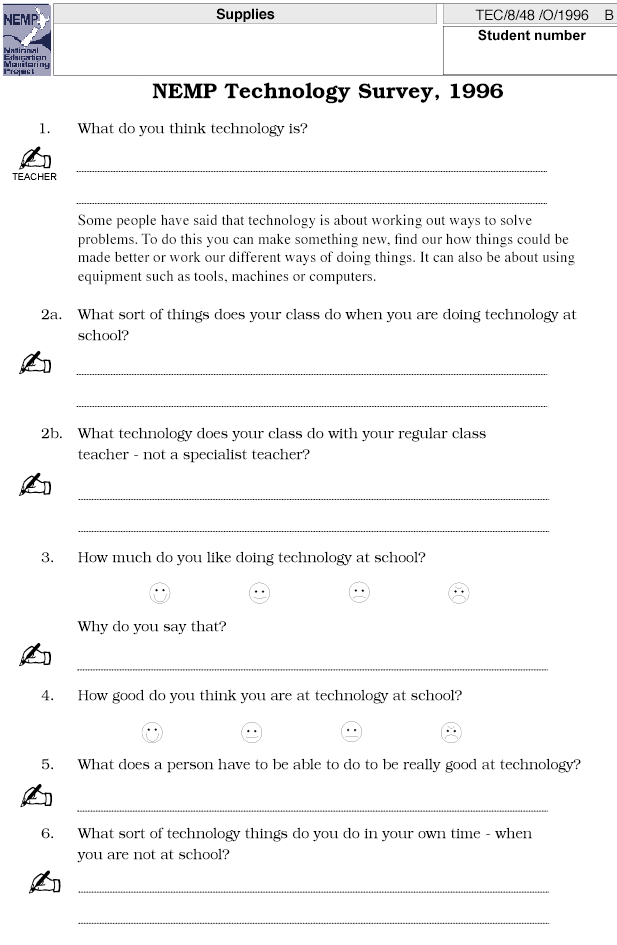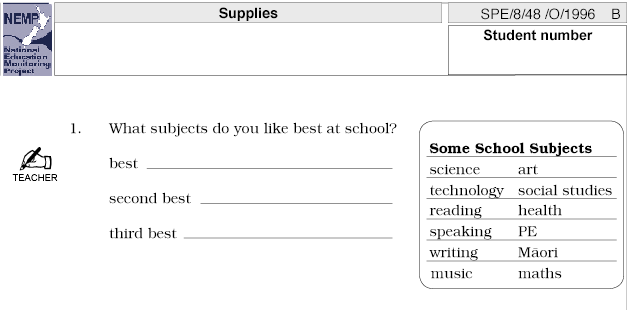(Click
on image for enlargement)

Download ![]() 152kb
152kb
Adams, R.
S., & Chen, D. (1981). The Process of Educational innovation:
An International Perspective. Paris: Kogan Page.
Anderson, G. (1990). Fundamentals of Educational Research.
Lewes: Falmer Press.
Ball, S. J., & Goodson, I. F. (1985). Understanding Teachers: Concepts
and Contexts. In S. J. Ball & I. F. Goodson (Eds.), Teachers
Lives and Careers, . Lewes: Falmer Press.
Black, P. (1994). Technology in the School Curriculum. Science, Mathematics
and Technology (SMT) Education in OECD Countries, Paper 10.
Brown, C. (1993). Bridging the Gender Gap in Science and Technology:
How long will it take? International Journal of Technology and Design
Education, 3(2), 65-73.
Burns, J. (1990). Students attitudes towards and concepts of technology.
Report to the Ministry of Education . Wellington: Ministry of Education.
Burns, J. (1991). Technology - What is it and what do our students think
of it? The New Zealand Principal, 6(3), 22-25.
Cohen, L. and Manion L. (1985) Research Methods in Education.
Croom Helm, USA.
Compton, V., & Lagache, E. (1996). Technology Education: an alternative
framework for analysis. SAME Papers, 3-17.
Corporation, M. (1989). Systat. Evanston, Illinois: Microsoft.
Crooks, T., & Flockton, L. (1993). The Design and Implementation
of National Monitoring Outcomes in New Zealand Primary Schools (1):
University of Otago.
Department of Education. (1987). The Curriculum Review: Department
of Education.
Donnelly, J. F. (1993). Technology in the School Curriculum: A critical
bibliography. In E. W. Jenkins (Ed.), School Science and Technology:
Some Issues and Perspectives, . Centre for Studies in mathematics
and Science Education: University of Leeds.
Doornekamp, B. G. (1991). Gender Differences in the Acquisition of Technical
Knowledge, Skills and Attitudes in Dutch Primary Education: the need
for technology education. International Journal of Technology and
Design Education,1, 37- 47.
Doran, R., Lawrenz, F., & Hegelson, S. (1994). Research on assessment
in science. In D. Gabel (Ed.), Handbook of reseach on science teaching
and learning, . New york: MacMillan Publishing Co.
Durndell, A. (1995). Gender and Computing: Persisting Differences. Educational
Research, 37(3), 219-27.
Dweck, C. (1986). Motivational processes affecting learning. American
Psychologist, October.
Eggleston, J. (1993). Teaching Design and Technology. Buckingham:
Open University Press.
Gardner, P. (1995). Measuring Attitudes to Science: Unidimensionality
and Internal Consistency Revisited. Research in Science Education,
25(3), 283-389.
Glaser, B., & Strauss, A. (1967). The Discovery of Grounded Theory.
Chicago: Aldine.
Glass G.V. and Stanley J.C. (1970) Statistical methods in Education
and Psychology . New Jersey: Prentice Hall Inc.
Gorman, T. (1991). The Framework for the Assessment of Language.
United Kingdom: Assessment of Performance Unit.
Grant, M. (1986). Starting points. In A. Cross & P. Murphy (Eds.),
Technology in Schools, . London: Milton Keynes: Open University
Press.
Hendley, D., & Lyle, S. (1996). Pupils' Perceptions of Design and
Technology: a case-study of pupils in South Wales. Research in Science
and Technological Education, 14(2), 141-151.
Initiatives, T. a. V. E. (1988). Technology for TVEI. London:
Training Commission.
Jarvis, T., & Rennie, L. (1996). Perceptions about Technology Held
by Primary Teachers in England. Research in Science and Technological
Education, 14(1), 43-54.
Johnson, D. & Stratton, R. (1966) Evaluation of five methods of
teaching concepts. Journal of Educational Psychology 57, p. 48-53.
Johnson, S., & Murphy, P. (1986). Girls and Physics. Reflections
on Assessment of Performance Unit Findings.
Jones, A. (1995). Technolgy education in the New Zealand curriculum:
from policy to curriculum. SAME papers, 1995, 187-201.
Jones, A., & Carr, M. (1992). Teachers Perceptions of Technology
Education: Implications for Curriculum Innovation. Research in Science
Education, 22, 230-239.
Jones, A., & Carr, M. (1993). Towards Technology Education.
(Vol. 1). Hamilton: Centre for Science and Mathematics Education Research.
Kinnear, A. (1995). Introduction of microcomputers: A case study of
patterns of use and children's perceptions. Journal of Educational
Computing Research, 13(1), 27-40.
Magnotto, J. N. (1996, ). Grounded Theory: Research as Praxis.
Paper presented at the Conference on College Composition and Communication,
Milwaukee.
Mather, V., & Jones, A. (1995). Focusing on Technology education:
the effects of concepts on practice.
set, 2(Item 9), 1-4.
McCarthy, A. C., & Moss, D. (1990). Pupils Perceptions of Technology
in the Secondary School Curriculum: a case study. Educational Studies,
16(3), 207-236.
McCarthy, A. C., & Moss, G. D. (1994). A Comparison of Male and
Female Pupil Perceptions of Technology in the Curriculum. Research
in Science and Technological Education, 12(1), 5-13.
McKinley, E. (1992). Research Issues in Maori Science Education. SAME
papers, 1992, 5-21.
McKinley, E., Waiti, P. M., & Bell, B. (1992). Language, culture
and science education. International Journal of Science Education,
14(5), 579-595.
McKinnon, D. H., Nolan, C. J. P., Openshaw, R., & Soler, J. (1991).
New Zealand Curriculum Innovation in
Historical and Political Context. Journal of Curriculum Studies,
23(2), 155-175.
Ministry of Education. (1993a). The New Zealand Curriculum Framework.
Wellington: Learning Media.
Ministry of Education. (1993b). Science in the New Zealand Curriculum.
Wellington.
Ministry of Education. (1993c). Technology in the New Zealand Curriculum:
Draft. Wellington: Learning Media.
Ministry of Education. (1995). Technology in the New Zealand Curriculum.
Wellington: Learning Media.
Nash, M., Allsop, T., & Woodnough, B. (1984). Factors affecting
pupil uptake of technology at 14+. Research in Science and Technology
Education, 2(1), 5-19.
Nunnally, J.C. (1975) Psychometric Theory - 25 years ago and now. Educational
Researcher, 4 (10) 7-21.
Oakes, J. (1990). Opportunities, achievement and choice:Women and minority
students in science and mathematics. In C. B. Cadzen (Ed.), Review
of Research in Education, (Vol. 16, ). Washington DC: American Educational
Research Association.
Ohia, M. (1993). Adapting mathematics to meet Maori needs and aspirations:
an attempt to shift paradigms. SAME Papers, 1993, 104-115.
Osborne, R., & Wittrock, M. (1985). The generative learning model
and its implications for learning science. Studies in Science Education,
12, 59-87.
Paechter, C. (1991) Subcutural Retreat: negotiating the Design and Technology
Curriculum. British Educational Research Asssociation Annual Conference.
Prout, A., & James, A. (1990). A new paradigm for the sociology
of childhood? Provenance, promise and problems. In A. James & A.
Prout (Eds.), Constructing and reconsructing childhood: contemporary
issues in the sociological study of childhood, (pp. 7-34). London:
The Falmer Press.
Rennie, L. J. (1993). Implementing Technology in the School Curriculum:
A Case Study Involving Six Secondary Schools. Journal of Technology
Education, 5(1), 38-53.
Rennie, L. J. (1995). English and Australian Children's Perceptions
about Technology. Research in Science and Technological Education,
13(1), 37-52.
Rennie, L.J. & Punch K.F. (1991) The relationship between affect
and achievement in science Journal of Research in Science Teaching
28 (2) 193 - 209.
Ritchie, S., & Butler, J. (1990). Aboriginal Studies and the science
curriculum: affective outcomes from curriculum intervention. Research
in Science Education, 20, 249-253.
Sashaani, L. (1994). Gender Difference in Computer Experience and its
Influence on Computer Attitudes. Journal of Educational Computing
Research, 11(4), 347-367.
Schibeci, R. (1984). Attitudes to science: An update. Studies in
Science Education, 11, 26-59.
Shuker, R. (1980). New Zealand's Educational History: a revisionist
perspective. Delta, 27(November), 38-47.
Simpson, R., Koballa, T., Oliver, S., & Crawley, F. (1994). Research
on the affective dimension of science learning. In D. Gabel (Ed.), Handbook
of reseach on science teaching and learning, . New York: MacMillan
Publishing Co.
Smith, A. (1995, ). Incorporating children's perspectives into research:
challenge and opportunity. Paper presented at the New Zealand Association
for Research in Education, Annual Conference, Palmerston North.
Solomon, J. (1994). Towards a notion of home culture: science in the
home. British Educational Research Journal, 20(5), 565 - 577.
Speering, W., & Rennie, L. (1996). Students' perceptions about Science:
the Impact of transition from primary to secondary school. Research
in Science Education, 26(3), 283-298.
R. Skemp (1979) Intelligence, Learning and Action. Chichester:
Wiley
Tuckman, B. W. (1988). Conducting Educational Research. Orlando,
Florida: Harcourt, Brace, Jovanovich.
Wagemaker, H. (1987, ). Maori and Pakeha School Performance: The
Challenge for Educational Policy and Research. Paper presented at
the Comparative and International Education Society Conference, Washington
D.C.
Wilson, V. (1983). A meta-analysis of the relationship between science
achievement and science attitude. Journal of Research in Science
and Teaching, 20(9), 839-850.
